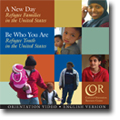|
 Briefs From CAELA Network Briefs From CAELA Network
 Teaching Pronunciation to Adult English Teaching Pronunciation to Adult English
Language Learners NEW!
This brief discusses the research on pronunciation and older learners and elements of pronunciation to focus on with this population. It suggests evidence-based strategies for instruction and recommends further research on the topic.
Managing Programs for Adult English Language Learners
This third in a series of briefs for administrators reviews the knowledge and skills that program administrators need to have, including knowledge of learner needs, assessment of learner progress, and the ability to communicate with stakeholders both inside and outside the classroom and the program. (To be released October 2009.)
 Spotlight on CAELA Network States Spotlight on CAELA Network States
CAELA Network staff work with 12 states to develop high-quality professional development systems and approaches within the states. Here we highlight the work of four of the states. In future issues, we will spotlight the work of other states.
Update From Florida
 The Florida CAELA Network team has developed a new online professional development survey to be used statewide. The team collected questions from Regional Training Centers to build the survey, which is available to teachers and administrators across the state. Data collected will be available to the CAELA Network team, Regional Training Centers, and Florida professional development providers for long- and short-range planning. The Florida CAELA Network team continues to provide professional development throughout the state on applying Florida’s adult ESOL content standards and enhancing teachers' use of technology in instruction. The Florida CAELA Network team has developed a new online professional development survey to be used statewide. The team collected questions from Regional Training Centers to build the survey, which is available to teachers and administrators across the state. Data collected will be available to the CAELA Network team, Regional Training Centers, and Florida professional development providers for long- and short-range planning. The Florida CAELA Network team continues to provide professional development throughout the state on applying Florida’s adult ESOL content standards and enhancing teachers' use of technology in instruction.
 Update From Massachusetts Update From Massachusetts
The Massachusetts CAELA Network team is focusing its professional development planning on promoting transitions for adult English language learners from ESL instruction to postsecondary education and employment. The team has carried out a comprehensive study to identify areas in which to improve support for transitions in the state. This includes conducting a needs assessment with directors of programs focused on transitions; consulting research on promising instructional, programmatic, and assessment practices to support transitions; and reviewing the work of the Minnesota CAELA Network team on providing professional development for instructors on promoting transitions.
 Update From Minnesota
Update From Minnesota
As part of their focus on data-driven PD, Minnesota designed and administered an online survey to collect information about ESL professionals’ work and training experience, their work environments, their classroom challenges, and their PD needs. The results are currently being analyzed and used to develop a statewide PD plan. Minnesota has also increased opportunities for follow-up to trainings, including opportunities to earn graduate credits or the chance to earn 5 continuing education units for 1) attending a training, 2) implementing ideas from training into the classroom, and 3) submitting lessons and reflections on that experience to teacher education faculty.
 Update From Virginia Update From Virginia
The Virginia CAELA Network team is collaborating with the Virginia Adult Learning Resource Center (VALRC) to develop the ESL component of their Adult Education Certification Program. The ESL certification program was introduced to adult education program managers in the fall 2009, and to teachers at the Virginia Adult Institute for Lifelong Learning (VAILL) conference in July 2009. This involved two days of professional development, including Introduction to Language Learning: Research and Methods; Content Standards; Assessment, Accountability, and the National Reporting System (NRS); Resources for Teaching Adult English Language Learners; and Teaching and Learning Technology in the ESOL Classroom. Participants are developing an action plan for further research and practice in their chosen areas of interest, to be submitted for approval as part of the certification process.
 ESL Resource Database ESL Resource Database
 Adult ESL professional developers, trainers, and state staff need resources that help them deliver high-quality, evidence-based trainings and sustained follow-up activities. The ESL Resource Database categorizes and annotates over 250 documents of interest to teachers, administrators, students, and researchers interested in education of adult English language learners and links directly to most of the resources online. Adult ESL professional developers, trainers, and state staff need resources that help them deliver high-quality, evidence-based trainings and sustained follow-up activities. The ESL Resource Database categorizes and annotates over 250 documents of interest to teachers, administrators, students, and researchers interested in education of adult English language learners and links directly to most of the resources online.
Read External Reviews
In cooperation with the National Institute for Literacy, selected resources from the ESL Resource Database have been externally reviewed and approved for inclusion in the Institute's LINCS English Language Acquisition Resource Collection. Two examples are below. Read the full text of the resource and the external review.
Workplace Instruction and Workforce Preparation for Adult Immigrants
The Framework for Quality Professional Development for Practitioners Working with Adult English Language Learners
 Resources About and for Refugee Populations Resources About and for Refugee Populations
The Cultural Orientation Resource Center (COR) housed at CAL can provide adult ESL practitioners working with refugee and newcomer populations with resources to help them meet learners’ unique needs. The COR Center provides a variety of resources about refugee populations to assist in the resettlement and adjustment of refugees including Refugee Backgrounders that provide insights and information about refugee populations and the Welcome to the United States guidebook and video in multiple languages, designed to help refugees adjust to their new lives in the United States. A video is also available that highlights the experiences of refugee families and youth in the U.S. – A New Day and Be Who You Are.
 Upcoming Conferences Upcoming Conferences
The following conferences may be of interest to practitioners working with adult English language learners:
In 2009
In 2010 - Save the Dates!
|
|

 Network News is published quarterly by the CAELA Network at the Center for Applied Linguistics and is offered free of charge. If you have any questions or if you have information that you would like us to consider including in the newsletter, please contact the editor at
Network News is published quarterly by the CAELA Network at the Center for Applied Linguistics and is offered free of charge. If you have any questions or if you have information that you would like us to consider including in the newsletter, please contact the editor at 
 The Florida CAELA Network team has developed a new online professional development survey to be used statewide. The team collected questions from Regional Training Centers to build the survey, which is available to teachers and administrators across the state. Data collected will be available to the CAELA Network team, Regional Training Centers, and Florida professional development providers for long- and short-range planning. The Florida CAELA Network team continues to provide professional development throughout the state on applying Florida’s adult ESOL content standards and enhancing teachers' use of technology in instruction.
The Florida CAELA Network team has developed a new online professional development survey to be used statewide. The team collected questions from Regional Training Centers to build the survey, which is available to teachers and administrators across the state. Data collected will be available to the CAELA Network team, Regional Training Centers, and Florida professional development providers for long- and short-range planning. The Florida CAELA Network team continues to provide professional development throughout the state on applying Florida’s adult ESOL content standards and enhancing teachers' use of technology in instruction. Update From Massachusetts
Update From Massachusetts 
 Update From Virginia
Update From Virginia  Adult ESL professional developers, trainers, and state staff need resources that help them deliver high-quality, evidence-based trainings and sustained follow-up activities. The ESL Resource Database categorizes and annotates over 250 documents of interest to teachers, administrators, students, and researchers interested in education of adult English language learners and links directly to most of the resources online.
Adult ESL professional developers, trainers, and state staff need resources that help them deliver high-quality, evidence-based trainings and sustained follow-up activities. The ESL Resource Database categorizes and annotates over 250 documents of interest to teachers, administrators, students, and researchers interested in education of adult English language learners and links directly to most of the resources online.

